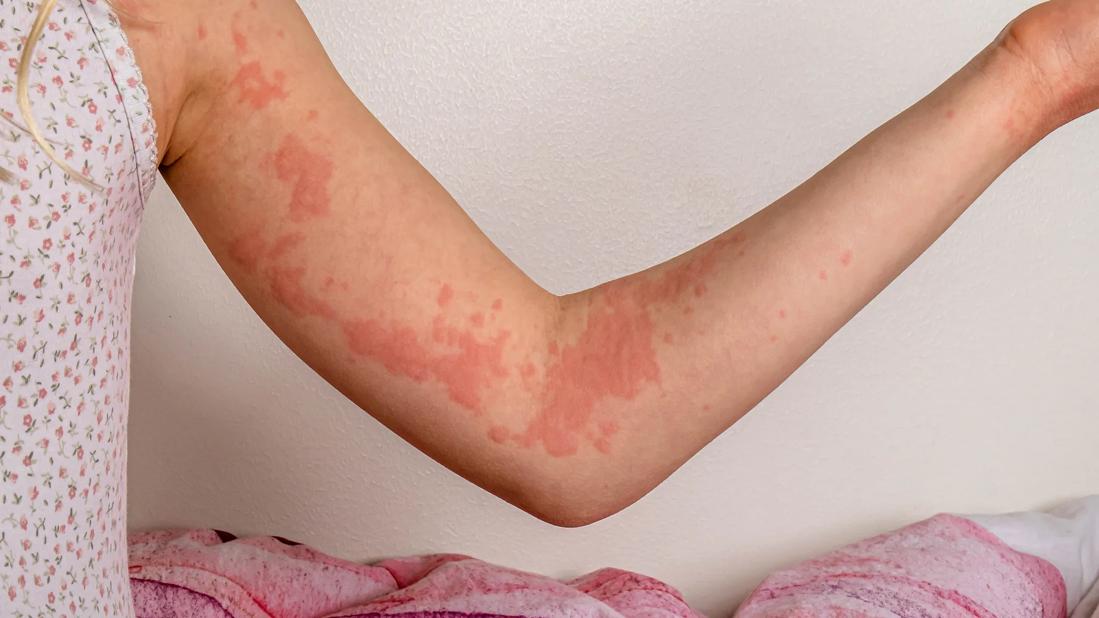Rarely are the red, itchy welts from chronic hives connected to what you eat

Image content: This image is available to view online.
View image online (https://assets.clevelandclinic.org/transform/a756ac45-fb38-4a27-be48-2366dbdda27b/hives-arm-1389641807)
Arm covered in hives
If you have chronic hives (also known as chronic idiopathic urticaria), you may wonder if what you eat can cause the red, itchy skin welts known to last more than six weeks.
Advertisement
Cleveland Clinic is a non-profit academic medical center. Advertising on our site helps support our mission. We do not endorse non-Cleveland Clinic products or services. Policy
Should you avoid certain foods? Should you follow a low-histamine diet? Should you be looking for foods to eat to heal chronic hives?
While chronic hive triggers can include things like exercise, stress and heat or cold temperatures, allergist Dylan Timberlake, MD, explains why foods aren’t typically responsible for triggering or causing chronic hives.
Is there a connection between what you eat and chronic hives?
“It’s definitely a question allergists get a lot, and it’s a difficult one because there isn’t much of a connection between your diet and chronic hives,” clarifies Dr. Timberlake.
“There are certain foods that are high in histamine, and then there are other foods that are high in a certain amino acid called histidine, which gets metabolized in our body to histamine. People tend to think if they’re eating foods that are high in histamine or histidine that it can lead to hives.”
But that thought process is problematic, he says. Rarely do food allergies cause chronic hives.
“People who have chronic hives typically experience welts and bumps on their skin and even angioedema, which is swelling of the skin,” he continues. “But you really shouldn’t have any internal swelling — throat tightness, difficulty breathing, chest tightness, wheezing, abdominal pain, nausea and vomiting. People who have hives and one of those other symptoms are diagnosed with anaphylaxis, a severe allergic reaction.”
Advertisement
Dr. Timberlake says there isn’t a specific diet that can help manage or prevent chronic hives, as chronic hives aren’t typically triggered by food.
“If you’re having a full body reaction to certain foods, we’d be concerned more about a true food allergy, and then that’s a different diagnosis with different testing,” he notes.
And even when it comes to certain foods that aren’t high in histamine such as spicy foods or certain additives, Dr. Timberlake says he sees people with chronic hives try to avoid them.
“When people avoid those foods, there wasn’t a significant benefit,” he says. “In a meta-analysis of 20 studies, less than 5% of people who avoided those foods had spontaneous resolution of their hives.”
But Dr. Timberlake adds that there are a few factors that can contribute to chronic hives.
“There are certain medications, such as nonsteroidal anti-inflammatory drugs (NSAIDs), that can irritate allergy cells. Those cells are more likely to get activated and release their chemicals. Also, for people with chronic hives, drinking alcohol can make chronic hives worse or trigger those hives.”
When it comes to your chronic hives, there are a lot of ways to manage your triggers — but what you eat shouldn’t really be a concern. You should talk to your doctor before trying diets such as the low-histamine diet or the elimination diet, as it can be a slippery slope of false hope.
“Unfortunately, what happens is you take a food out of your diet and your hives may get better for a while. But then, your hives become worse while you’re still avoiding that food. Then, you’ll think that it must be another food, so you start avoiding that food,” illustrates Dr. Timberlake. ”It can get to a point where you’re avoiding 20 or 30 foods with no real relief.
”If you choose to eliminate food from your diet and you notice your hives are better, make sure you add that food back to your diet to see if your hives get worse.”
Advertisement

Sign up for our Health Essentials emails for expert guidance on nutrition, fitness, sleep, skin care and more.
Learn more about our editorial process.
Advertisement
Tough times can become even tougher if they leave an itchy rash on your skin
Lifestyle adjustments like stress reduction, wearing softer clothing and staying out of the sun can help manage flares
Your provider can develop a personalized treatment plan, which may include prescription medications, antihistamines and corticosteroids
Infections, autoimmune conditions, major life changes, extreme temps and even sunlight can cause this itchy condition
The fluctuation in your hormones can cause the red, itchy welts
Combat stress and anxiety — common chronic hives triggers — by focusing on sleep, staying active and leaning on others for support
Sea lice aren’t really lice, but these tiny creatures can trigger an unpleasant allergic reaction
A distressed skin barrier can lead to red, itchy and scaly skin
Prioritize your health by managing stress, strengthening your social connections and getting quality sleep
Bolsters, blankets, pillows and blocks can offer extra support, stability and comfort
Allergies, postnasal drip, asthma or reflux could be to blame for a cough that won’t quit